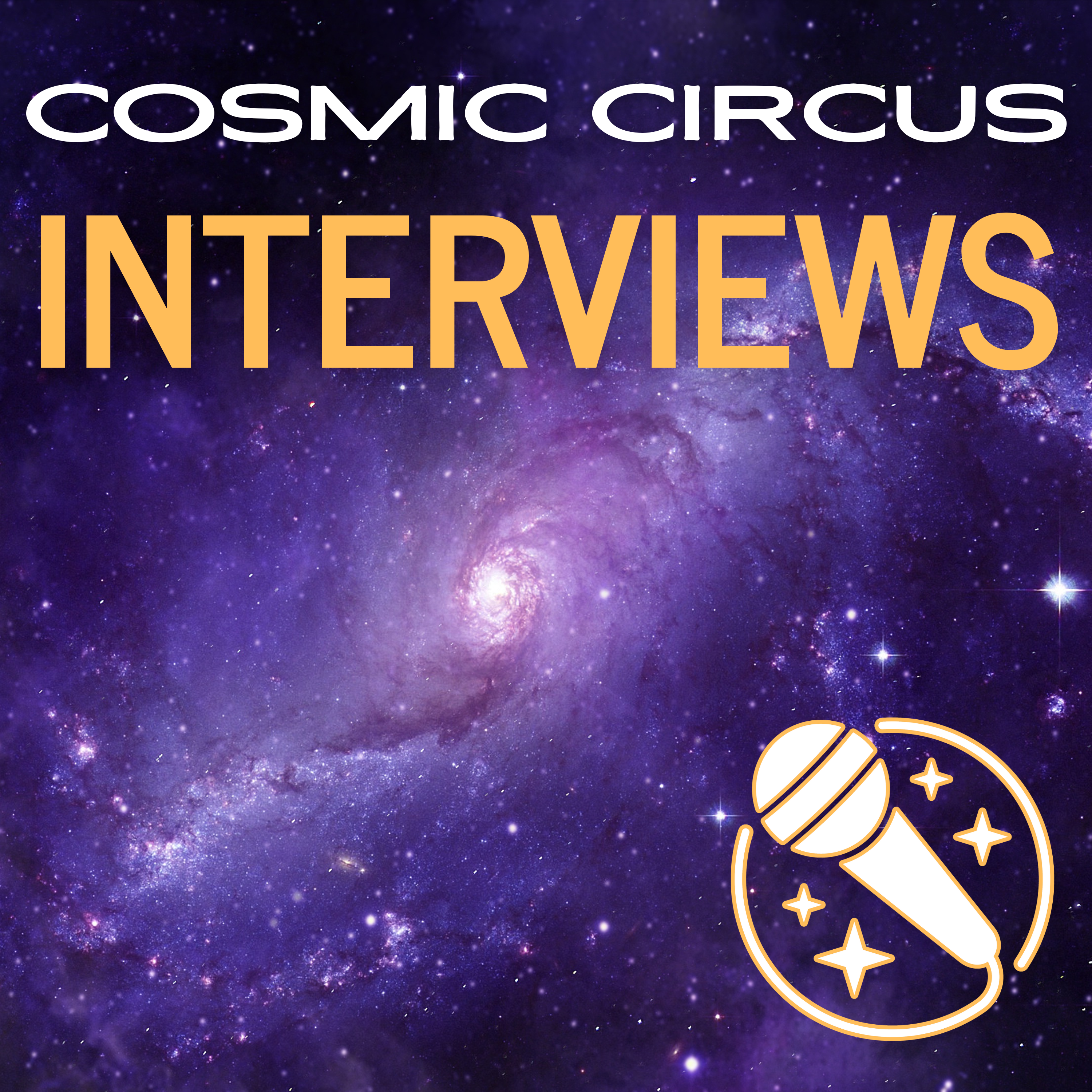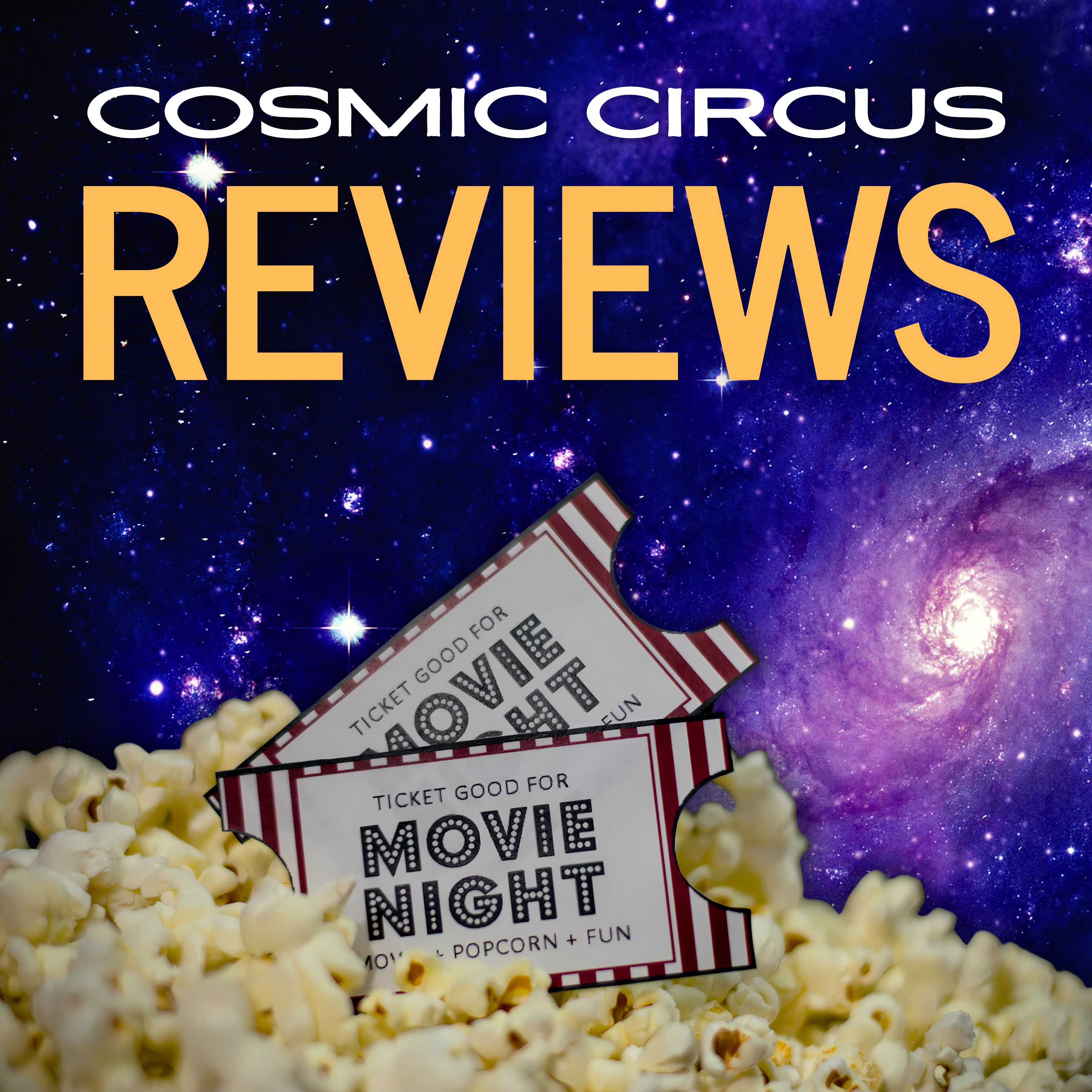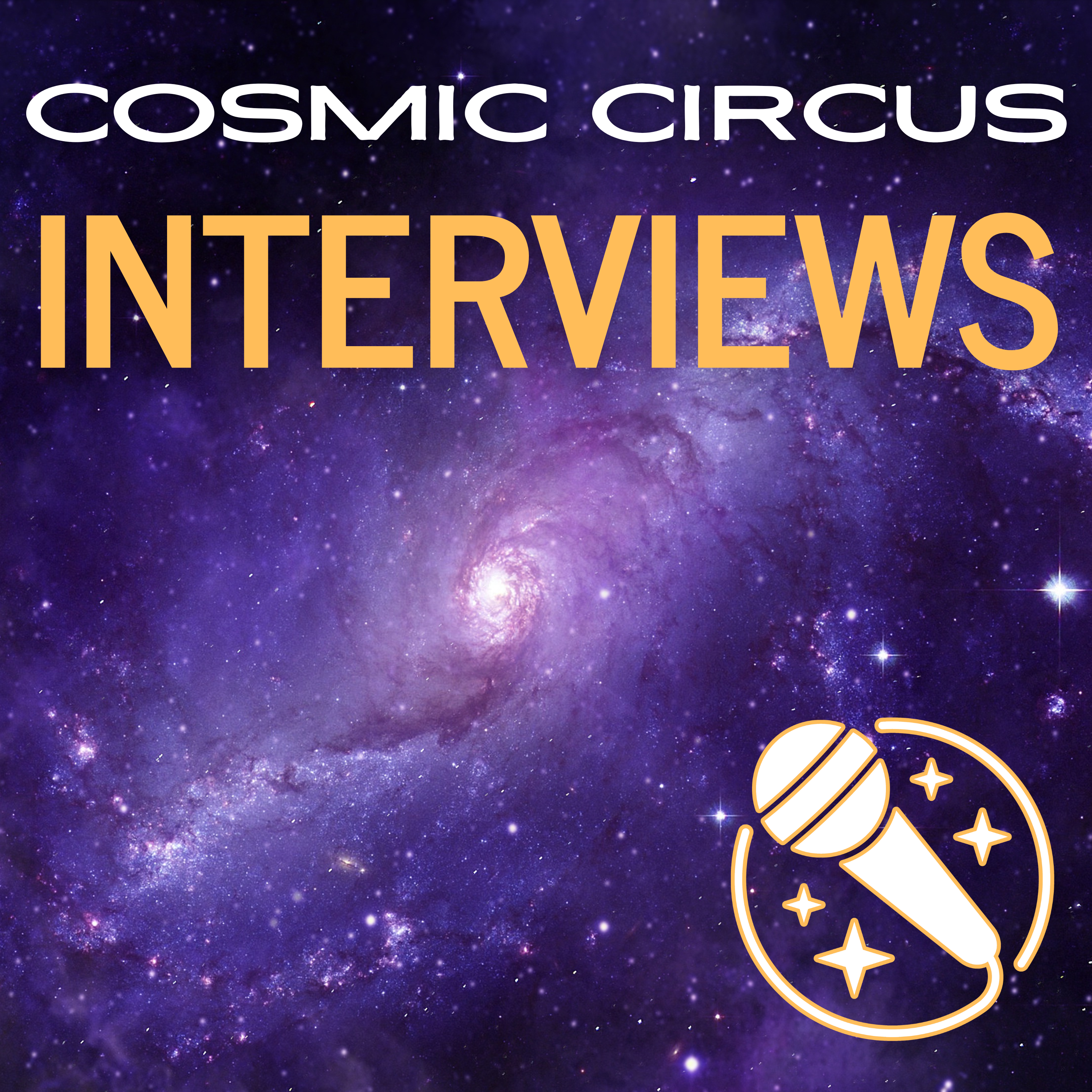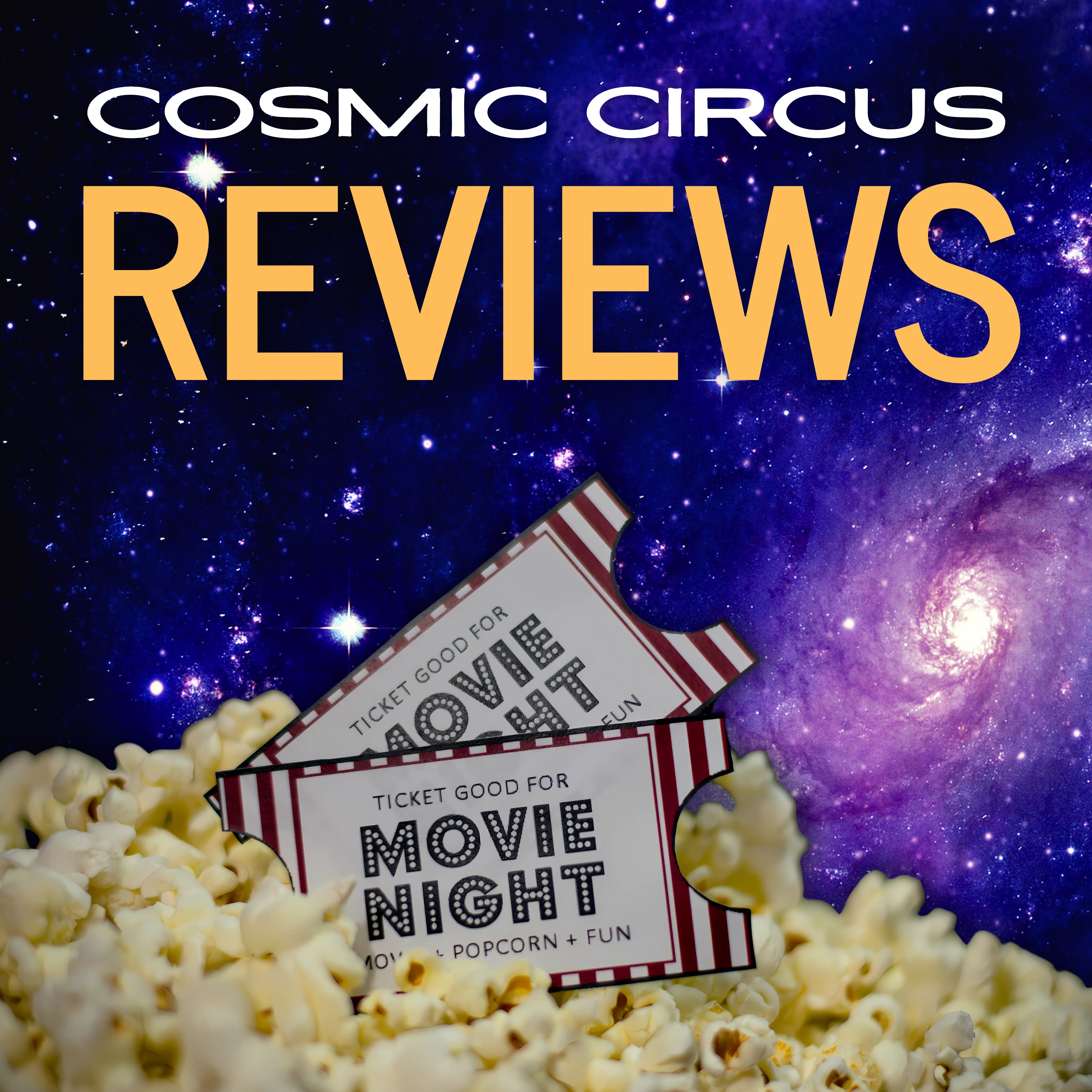Episode Transcript
[00:00:00] Speaker A: Hello, and welcome to another episode of the Cosmic Cafe, the companion interview podcast for thecosmicsircus.com. I'm isla Ruby, and today we have a special musically inclined guest. Stefan Smith composed a score for Batman the doom that came to gotham, and also the latest PBS superwise, super y's comic book adventures. This was a fun conversation, and I hope you enjoy.
[00:00:31] Speaker B: Well, thank you for doing this. I'm really excited to talk.
[00:00:34] Speaker C: Yeah, no problem. I'm excited as well.
[00:00:36] Speaker B: Okay, so I guess I'll just jump into this.
So let's talk about super y. So we are very familiar with this in my house because I have a young daughter, so this is perfect.
[00:00:50] Speaker C: Awesome.
[00:00:54] Speaker B: How did you get onto this project? Can you talk about that?
[00:00:58] Speaker C: It's actually pretty funny. So there was a lady that I knew through a connection that paired me up with nine story. She was friends with one of the producers there, and they actually sent the prompt over. And I'm more of a fan of action movies and things like that. And so that's kind of like what I like to score. And so she's like, it's a children's series for PBS kids. And I was like, I don't know if I can do Barney and friends, but it looked like a cool project. And once I talked to them and just their musical approach of what they wanted to do, like 70s cop show funk, mixed in with all different types of elements and musical styles, I was like, one, this will be a great way for me to hone my craft for songwriting, but also with all different types of styles. So I submitted a demo where I sang, and I worked with my friend on it as well, and I just sent it off, and I was like, you know what? Let's see what happens. And then we got a call back. My agent got a call back saying that they want to hire me to write for the show, and I was really excited about it. So initially, I was kind of skeptical just because I'd never done children's music before, but I ended up loving it. It was a lot of fun.
[00:02:13] Speaker B: And it's so different, too, because the pbs things, especially with superwise, very literacy geared, right.
I've read about Sesame street, and Sesame street has really specific things that they try to include and how they present the material.
Was there anything similar like that for super Y? Because it's very like you're teaching kids to read and helping kids to read.
[00:02:38] Speaker C: Yes. It's very curriculum based.
So the songs that were written out, we had to basically go through the script. It was written in the script, and I had to take lyrics from that and then create the songs and even tweak those things as so. And there was a lot of back and forth between PBS kids, nine story media and brownback to decide, does this work? Is the tempo too fast for the words? Because the kids have to understand this. So there was, like a constant feedback loop that we had to go through in order to get things just right. So, yes, it's very involved when it comes to that part because you want to make sure kids are retaining the information that it's hooky and groovy, that they can dance to it but also learn from it. So, yeah, it's completely different from anything else I've done.
[00:03:33] Speaker B: So the songs, what I really like about super Y and all the PBS stuff in general, it's like an earworm. Right. For kids and parents, it just gets stuck in your head, and I think that's so amazing for just helping them learn.
[00:03:48] Speaker C: Good for the kids, bad for the parents.
[00:03:52] Speaker B: That's true. But I can hear the song in my head over and over, but that's good.
Okay, so how do you create an earworm? That's kind of like a hard question, maybe, but what goes into that? Because it doesn't just happen.
[00:04:11] Speaker C: Yeah, I think creating earworms, you have to have a really catchy, rhythmic element, something that really gets your body moving. And I think the use of syncopation in general tricks the ear enough to want to know what's coming next. So when you don't have something that's just 1234 but it's one, two, immediately YouR ear is like, oh, what's going on over here? So I think it's using a combination of rhythm, but also somewhat simple motives or a simple melody on top of something interesting rhythmically.
And obviously, harmony plays into it as well because that kind of shapes the feeling of the song. So I think making something simple but catchy is the key, which is the hardest thing to do because people do this every day and it's so hard not to copy someone else. So trying to create something that's simple, hooky, and an earworm, especially for children, is a challenge.
[00:05:21] Speaker B: So you mentioned earlier that there was, like, a 70s cop show vibe for this.
Can you talk more about that? Can you talk about influences for this.
[00:05:34] Speaker C: And any of mean? I think we were very influenced by schoolhouse rock, that type of vibe. And so the director, Jerry, I love him. He's like the canadian Jack black. So it was like this collaboration of, like, let's try this and maybe we should try this here. And let's do a little jazzy hit here.
So it just became this laboratory of finding the sound.
Gary really steered true to that because he has huge ties to anime. So there was elements of that in some of the transition scenes when they use their powers.
Very anime driven, the art style in general. And so I hope that answered your question.
[00:06:24] Speaker B: No, it totally did. No. That's awesome.
Okay, so you mentioned the director, and I don't know if this was true for him, but how do you collaborate when the person doesn't necessarily speak music? Because it's like this very specific world that if you're a creative director, maybe you don't know that you're creative in other ways.
[00:06:46] Speaker C: Yeah. When I was younger, I used to be so bad with this particular situation because I come from a very dominant classical music background. So when I'm speaking music, it's like a second language to me, and I sometimes assume people know it. So I think the thing that I learned the most is speaking in adjectives.
People always kind of understand that a little more than being like, maybe we should try this instrument or this instrument. Because then you run into cases where they're like, let's try the tuba there. But they really meant a cello or something. So it's like, they may not know.
That's kind of absurd, but they may not know the full knowledge of the orchestra and the palette. So it's better to speak in adjectives to be able to decide what's the mood, how do we want to feel?
And then from there, I can kind of figure out a collection of instruments or orchestration to kind of hone in on that feeling. And then we kind of tweak it as we go now.
[00:07:50] Speaker B: So for this, what was recording this, like, were there sample tracks? I think I read that or heard that with Batman, or was it know, in studio recording?
[00:08:00] Speaker C: Yeah. So part of it was recorded in the studio, and then the majority of the music production was done by myself at my a lot. I think the entire score and the show was all sample orchestration. But I do a lot of programming, and I think my experience being a session musician on the stages, I'm just around that sound a lot. So it's kind of easy for me to be able to tweak virtual instruments to make them sound even more realistic. Not that I want to, but sometimes you have to to meet the like, of course you want to hire this big group and stuff, but money comes into play.
And so the vocals were all recorded in Canada.
And the actors actually recorded them, so they weren't, like, trained singers.
And that was a stylistic choice, too. We wanted to make sure that it felt like kids were singing. So there are little pitch issues here or there, but that's kind of the characteristic of kids when they're singing.
But, yeah, we recorded all the vocals ahead of time, and then we did sampled references of the songs, and from there, those were sent to the animators.
[00:09:17] Speaker B: Okay.
[00:09:18] Speaker C: And then they locked that to picture, and then from there, sent the final edits of each episode. And then I scored each episode as well as writing the songs for each episode. So it was a very lengthy process. Ended up being awesome.
[00:09:36] Speaker B: Okay, so let's talk about for an individual episode and maybe the whole thing in general. So from idea to actually having an episode complete, because there's no magic wand and it's a lot of work. How long does that take?
What is the process like?
[00:09:56] Speaker C: Well, the first part with this company or these companies, the first part of the process was, like I said, developing the songs, tweaking everything, recording that, and then getting that locked.
And that was probably done over the course of. Man, I don't even remember, maybe a few months or so, but it was turning around, like, five episode batches every two weeks or something, or maybe week or I can't remember what. It was fast. You had to write a lot of music in a short amount of time. So that's creating, going from the lyrics, tweaking the lyrics to make sure they work musically, and then writing the melodies, and then from there, writing the music surrounding the melodies, and then recording vocals, et cetera.
It's not a lot of time to be able to do that, and I don't have this team of 25 ghostwriters working with me.
It's a small team, but a very robust, small team. So we were able to handle those turnarounds well.
[00:11:10] Speaker B: Was there anything really challenging or really satisfying that you were able to kind of bring to life with this?
[00:11:19] Speaker C: I think the challenging aspect is working within parameters.
I know in scoring, we have to work within parameters of syncing, duration, hit points, things like that. But when you have those already attached and then other things on top, like, you got to make sure that every word is heard and enunciated, and you have to make sure that it's catchy and simple and that the rhythm isn't too complex for the children to sing. These are things that you don't really run into unless you're working on a production like this.
So I think those challenges were the rewarding aspects of figuring out how to make things work with such strict guidelines.
[00:12:03] Speaker B: Got you.
[00:12:04] Speaker C: I think that's going to help me further on in my process of scoring.
[00:12:10] Speaker B: Oh, absolutely.
So you've done a lot of animation work, but you've also done some live action stuff earlier, I guess, in your career. Can you talk about differences between scoring for animation versus scoring for live action?
[00:12:26] Speaker C: I think animation relies heavily on the music, much more so than live action, because there's so much more you can do and take risks with animation, especially in action sequences and things like that. And there's also this stylistic consideration of what we call, like Mickey Mousing, where you're hitting every action on the screen and doing things like this. When you do that in live action, sometimes it can just be like overkill, but in animation it really works.
So I feel like there are different things you have to take into account.
Letting the live action actors drive the scene more than taking over with music. Sometimes animation, that's its job, to really blanket it and elevate it even more. Not to say that's not the job in live action, but usually people, I don't know, I feel like people are more drawn to the human characteristic of a person in front of me on screen talking versus an animated character. That's not to poopoo on animation, but it's just how people connect normally. So we need more elements to bring people in in animation. That includes more sound design and effects and music, et cetera.
[00:13:48] Speaker B: I think that's totally true. You need more to be immersive.
[00:13:54] Speaker C: Yeah.
[00:13:55] Speaker B: So obviously, you mentioned parameters with PBS. You had a bunch of things that you kind of had to hit on with this. How is it different working on something like that versus working on Batman, where you have this huge ip history and musical expectations with certain Batman notes?
I don't speak music very well.
[00:14:19] Speaker C: It's all good.
Batman is an intimidating ip. It's been around for a long time. There's a huge fan base, both like cult and mainstream. And so people definitely have expectations when they see a Batman film. This Batman, the doom that came to Gotham, very different animated film. And most fans will definitely agree with that because it's this dark suspense, horror kind of fantasy film and a lot of people, and lovecraftian, which you don't really see a lot. So my goal was to try to create something familiar with the harmonic language, that big orchestration, dark sound, really lows and high highs and soaring horns and all that. But trying to make it also its own kind of, because it is its own film. So I tried to steer clear of our traditional Batman themes because I wanted something different. So that was the biggest thing. And the challenge, I feel like I was constantly in my head about it in the beginning of it because, like, Hansa score is amazing, and James Newton, Howard and Danny Elton and Shirley Walker and all these people that created these sound worlds that still live on and on and on and on. And I'm like, how do I compete to that? And so instead of just seeing it as, like, a competition thing, I just put together a playlist of all their scores and just immersed myself into it. So by the time it was time to write, it was like I had that backbone of Batman Sound, and then I was able to expound from that or expand from.
So, yeah, it was very challenging. And not to mention the timeline and delivery schedule.
We didn't have time to record the orchestra just in this performance schedule. So besides writing an hour and 27 minutes of music, I had to program an hour and 27 music on top of that and mix and master.
[00:16:40] Speaker B: Well, it turned out great.
[00:16:42] Speaker C: Well, thank you. But, I mean, most people I talk to, they're like, wow, where did you record the score? I'm like, my studio, my computer, and they're like, what?
It took a long time to get all of that right. And from my background, the last thing I wanted to do was put something out that sounded like a Nintendo.
I think rising to the expectations of the fan base is the hardest challenge when it comes to a big ip. But you also have to accept that not everyone's going to love it, and you have to accept that people will love it, too. So I'm just happy to be a part of it.
For me, fairly new to the studio scene as a composer, it was an excellent way for me to be able to somewhat flex my muscles in a realm that a lot of people don't get the opportunity to write for. So I'm just blessed to be able to be part of the franchise.
[00:17:45] Speaker B: That's wonderful. I know we're getting pretty close on time. Can you talk about what you're working on now? Are you allowed to share that?
[00:17:54] Speaker C: I can share a few things.
I do a lot of concert music as well, for chamber ensembles and also year, I guess, the past two years, there was a commission I did for the Colburn School of Music called my young friend. It was written for Andrew Brady, who's the principal bassoonist of St. Paul Chamber Orchestra. Now, he was the principal of Atlanta Symphony, but I wrote that piece for bassoon and piano, which later, after him winning the job at St. Paul, he had introduced them to the piece. And so in March, I'll be flying out there for the premiere of St. Paul Chamber Orchestra and Andrew soloing on my young friend. So I'm really excited about that because St. Paul is one of the top chamber orchestras in the world and just to be asked to write something for them is incredible. And then also a piece that I wrote called Quintet and the key of blue that was commissioned by the Dubai ensemble. And their artistic director is Joseph Conyers, who's the principal bass of the Philadelphia Orchestra.
[00:19:00] Speaker B: So I'm from Philly, so that makes me happy.
[00:19:03] Speaker C: Oh, cool. Awesome. You know how amazing that orchestra is?
[00:19:06] Speaker B: Yes.
[00:19:07] Speaker C: String sound.
But yeah, he hit me up and was like, hey, we want you to write a piece for ensemble. So they premiered that last year, but also are going to go on tour this year at the Harris Theater in Chicago and other places around performing that piece. There's something else that's really exciting that I cannot talk about yet because it hasn't been announced. But if you want to know anyone who wants to know, just check out my socials because when I post that, it's going to be pretty awesome. And there's a few other projects that are in the works, that negotiation phase. So I will keep everyone posted.
[00:19:50] Speaker B: Oh, that's exciting. And what are your socials?
[00:19:53] Speaker C: So we can sure. Most of them IG Twitter and I think what's the other one? YouTube. All of those is at Viola Nation. V-I-O-L-A-N-A-T-I-O-N. So dorky. I'm a violist, but I got to represent.
But yeah, if you type in Viola Nation in Google, you'll find it. Yeah, you'll find awesome. And Spotify. Spotify. My name is Stefan L. Smith on there and all the other streaming platforms. So if you want to hear my music, check that out as well.
[00:20:32] Speaker B: Perfect. Well, thank you so much and thanks for taking the time to talk.
[00:20:35] Speaker C: Yeah, no problem. Thank you.
[00:20:39] Speaker A: Thank you for listening.
[00:20:40] Speaker B: You can find the companion article for this podcast along with all the other news. For those who like superheroes, science fiction and fantasy films, tv shows and other media, the Cosmiccircus.com. Have a great day.



